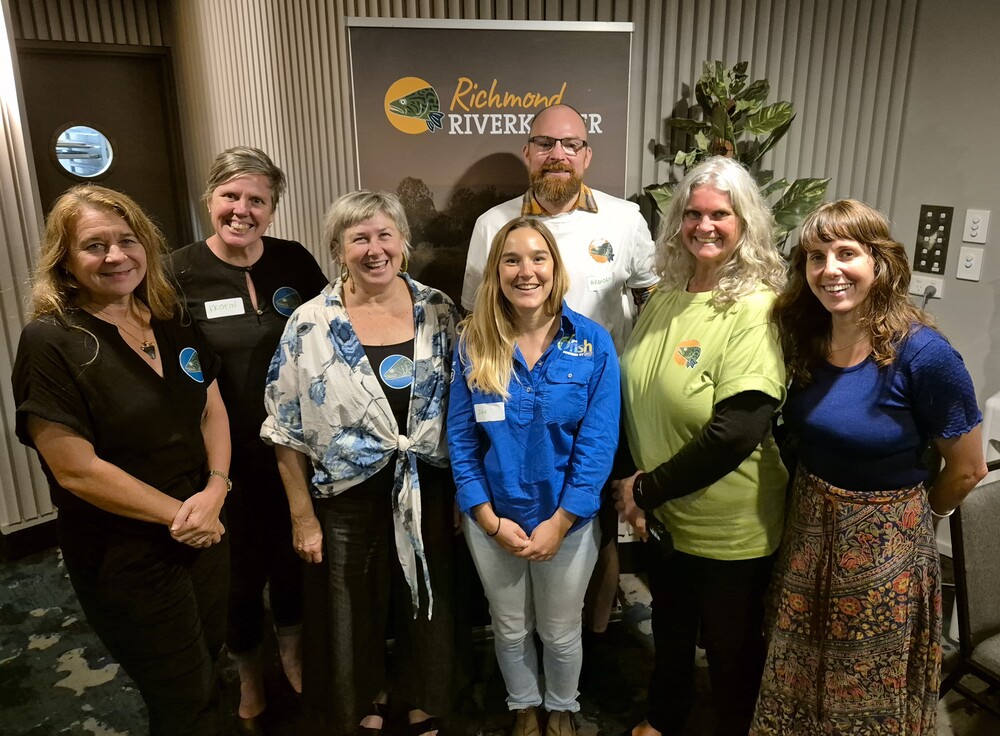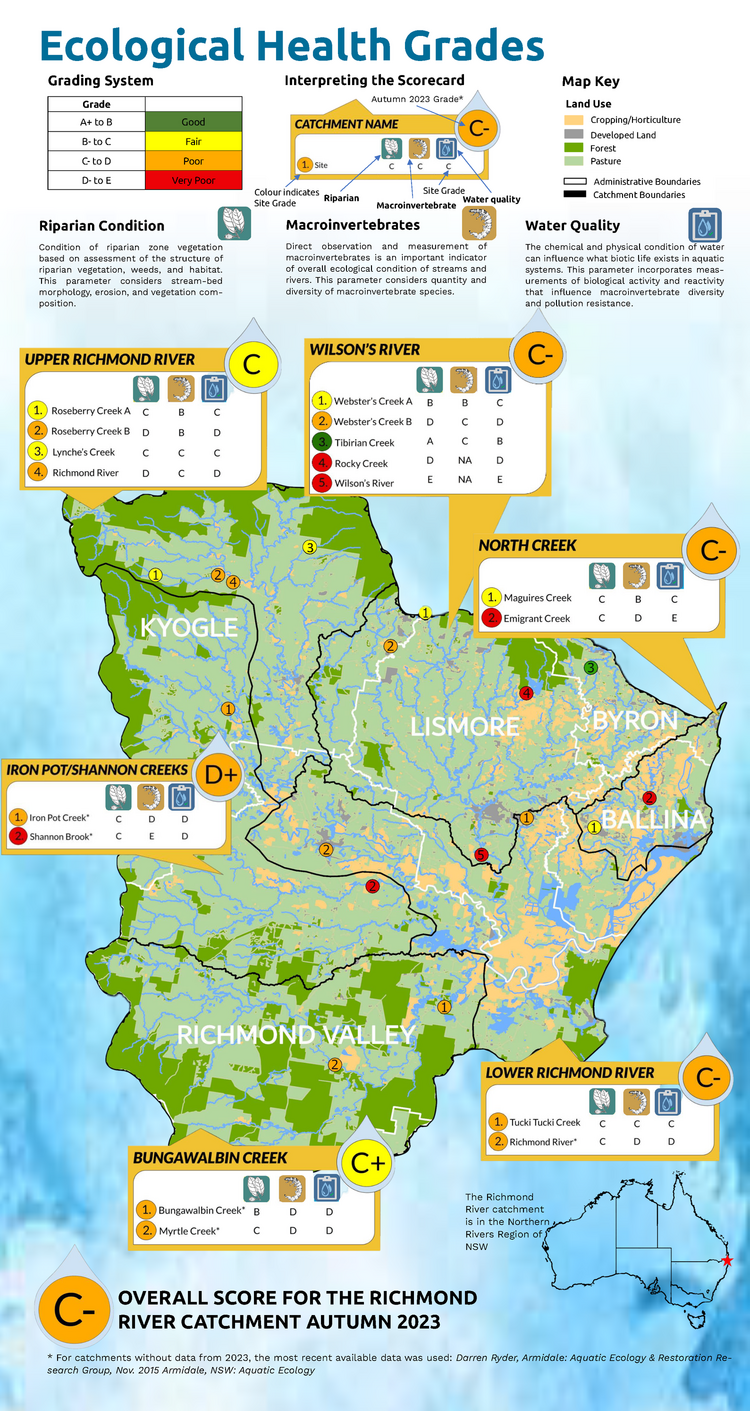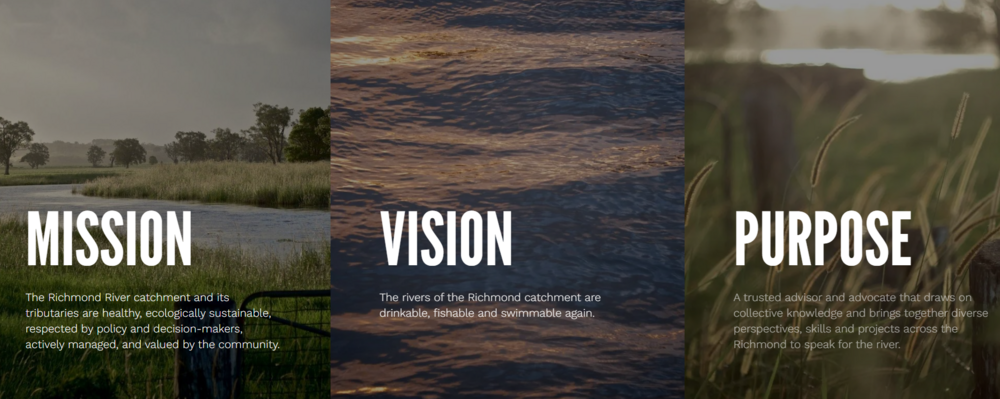NRs has joined the Riverkeeper movement to clean up Richmond catchment
Lara Leahy
30 March 2024, 7:03 PM
 Images provided by the Richmond Riverkeeper Association
Images provided by the Richmond Riverkeeper AssociationThe Richmond Riverkeeper Association was officially launched last week. It looks towards a cleaner, more user-friendly waterway - to make ”the rivers of the Richmond catchment, drinkable, fishable and swimmable again.”
In the Vision 2030 statement released last week, goals were outlined, strategic pathways were put forward as well as summarising how to measure success. Directly after the launch, their latest committee was voted in at the AGM (annual general meeting).

(The Richmond Riverkeeper Association Committee for 2024/25 (from left to right): Amanda Reichelt-Brushett (returned as President and Riverkeeper, Southern Cross University); Kristin den Exter (Secretary/Public Officer, Wilsons River Landcare); Adele Wessell (Executive Committee, Southern Cross University); Zoe White (Executive Committee, Ozfish Unlimited); Brendan Cox (Treasurer, River Ecology Australia); Vanessa Ekins (Executive Committee, Wilsons River Landcare); Michelle Lockwood (Executive Committee, Jagun Alliance. Photo: supplied)
Concern for the state of the river, post-flood was fueled by a series of formal reports, continuously outlining the dire condition of the river's health over the past 12 years and more. The founding members of the Richmond Riverkeeper Association (RKA) acknowledge the plight of the Richmond River, and work towards an integrated solution to restore it to a pristine waterway.
In 2012, the DPIE (Department of Primary Industries) and local councils surmised, after an 18-month study, that man-made and natural elements are affecting the river and reported, “... these factors contribute to the degradation of the waterway and occurrence of undesirable events such as poor water quality episodes and fish kills, particularly following some flood events.”
In 2015, a report card stated that “the Overall Grade for the Richmond catchment was D-, ranging from an F in the Wilsons River and upper Richmond estuary to a C in the headwater streams of the catchment. Twelve of the 17 river systems recorded a score of D or less.”
In 2019, a plan coordinated between the NSW Government, LGAs (local government areas) and key stakeholders was to find a "workable process to identify, scope and develop a preferred governance and funding framework for delivering improved river health outcomes.”
In 2021, a new plan emerged to “establish a management approach that will address issues and activities impacting the health of the estuary including catchment issues that are critical to estuary health.”
In 2023 the RKA partnered with River Ecology Australia and published the results of the latest report card for the Richmond River. What they found was the river remains under stress despite continued efforts.

Kristin Den Exter, a founding member of the RKA, talks about the issue the community faces.
”Our waterway does not reflect the sustainable beliefs and ethos of the area. It is in a shocking state and considered one of the most unhealthy rivers on the East Coast.”
The complicated nature of who is responsible for a waterway that spans seven LGAs, three NSW government boundaries and two states makes managing a catchment of this size a difficult negotiation.
Desired progress has not been made and the river still struggles. The RKA sees an opportunity for lasting impact with ongoing publicised knowledge of the rivers health, acting as a voice and a coordinator between LGA’s and other key stakeholders and the ability to hand back power to people to make an enduring difference.
Amanda Reichelt-Brushett, another founding member and president of the RKA outlines the importance of an alternative solution to take action for the river.
“With the changing of government happening so frequently and regional councils so cash-poor, there is not any way to invest in a long-term improvement and outcome for a river system,” says Amanda. “But, you need to gaze long term when you’re looking at things from a catchment-wide basis. You can’t just put a bandaid on things. We need measurable actions for improvement.”
Kristin explains it simply, “Everyone is responsible for the river, but nobody is.”
The Richmond Riverkeeper Association is a group of individuals, some scientists, coming together after the floods in 2022 to discuss and highlight what needs to be done.

The RKA has worked on grants, garnered support from local and state governments and joined an international organisation that supports waterways facing similar problems as the Richmond River, the Waterkeeper Alliance.
There are over 300 Waterkeeper groups globally, in 47 countries. The Richmond River was given exposure to the organisation when Kristin Den Exter visited Melbourne and learned of the Yarra or Birrarung Riverkeepers. The Yarra Riverkeepers (YKA) have worked closely with the RKA to mentor them and assist their progress.
In the Vision 2030 plan, the RKA has articulated their “overall aim of giving a voice to the rivers of the Richmond River and providing a foundation for a holistic approach to river management across six local government areas that affects the river catchment including Byron Shire, Lismore City, Ballina Shire, Richmond Valley Shire, Kyogle Shire, and Rous County Council, drawing together expertise and commitment.”
The strategies proposed take a four-pronged approach.
- Influence and Integrity - this includes protection measures as well as understanding the importance of the river and its uses in our community.
- Applied Knowledge and Capacity Building - utilising effective tools, resources, skills and knowledge to the best of its ability.
- Gateway to networks - Encouraging the understanding of traditional owners and cultural practices surrounding the catchment as a means of deepening peoples bonds.
- Coordinated action - Aspects to improve the rivers health and culture - including community, a First Nations Council for the rivers of the Richmond, testing, enhanced water quality, protection of riparian zones and better information provided to the Northern Rivers community.
“The big changes we want to see will take time. This is for our children and grandchildren. We start with values - giving water respect and not taking it for granted. We are very lucky here,” says Kristin, “We want to learn the cultural history of the river and listen to the stories of the First Nations people.”
“There are many ways to get involved. The next big hurdle is a grant so we can employ a coordinator to really head us in the right direction. We are looking for interested candidates. Watch this space as things will start to pick up, then,” Kristin says.
There are already many organisations and individuals getting involved in this volunteer-run association. This includes 18 groups of people from schools, indigenous groups and others, catching water bugs to check on the health of different parts of the river.
“Regular, thorough testing is key, not just after flood events,” says Kristin Den Exter.
“We know we will have made a difference if we see the return of a healthy oyster fishery in the lower catchment and the return of fish like the eastern freshwater cod in the upper reaches” said Amanda.
Kristin sums up the desired community involvement with the river stating, “Water connects us all. Anyone can be a Riverkeeper.”
Please note, the RKA website is currently being upgraded, and new information will be available shortly.

